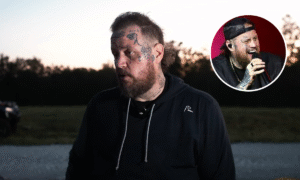Jelly Roll Announces Plans to Build a 100-Acre Rehab and Mental Health Center in Tennessee — “I Want to Help People Find the Hope I Once Lost”
Country music star Jelly Roll is once again proving that his success story is more than just about fame — it’s about redemption, compassion, and purpose. The 39-year-old artist, who has become one of the most inspirational figures in modern country music, has revealed plans to build a 100-acre rehabilitation and mental health treatment center on his property in Tennessee.
The project aims to provide free and affordable therapy programs, addiction recovery support, and mental health care for individuals struggling with the same demons Jelly Roll once faced himself.
“I’ve been where they are,” Jelly Roll said in a recent interview. “If I can help even one person find a way out, then it’s worth everything.”

From Jail Time to a Mission of Hope
Jelly Roll — whose real name is Jason DeFord — has spoken openly about his past, including his teenage years spent in and out of jail for drug-related charges. What makes his story extraordinary is not the fall, but the rise that followed.
After leaving prison, Jelly Roll turned to music as a form of therapy, using his songs to share stories of pain, survival, and redemption. Today, he’s one of the most beloved figures in country and Southern rock, known for his honesty and emotional depth.
Now, he’s taking that journey one step further — transforming his success into something that gives back to others.
“I sold drugs in this town,” he said. “Now I want to build a place that saves lives instead.”
A Place for Healing
According to his team, the new center will be located on Jelly Roll’s own property in Tennessee and will feature on-site housing, therapy spaces, outdoor programs, and music-based recovery sessions. The goal, he says, is to combine clinical treatment with creativity and community, helping people reconnect with themselves through art, faith, and nature.
“Music healed me, but I want to do more,” Jelly Roll said. “I want to create a place where people can feel seen, loved, and supported — even at their lowest.”
Fans have praised the project, calling it “the truest redemption story in country music.” Many have noted that Jelly Roll’s authenticity — his willingness to share his scars — is what makes him so powerful.
Fans & Fellow Artists React
Since the announcement, social media has flooded with messages of love and support. Country music artists, recovery advocates, and fans alike have shared how Jelly Roll’s music helped them through their darkest times.
“He’s proof that people can change,” one fan wrote. “He’s the kind of role model we need in country music.”
Others have praised him for shining a light on mental health — a topic often stigmatized in both the music industry and rural communities.
A Mission That’s Just Beginning
While the project is still in its early stages, Jelly Roll’s commitment is unwavering. He has already started working with mental health experts, recovery specialists, and local Tennessee officials to design a program that’s as effective as it is compassionate.
His goal is to create a space where no one feels judged for their struggles — a place that offers real, lasting recovery for anyone ready to turn their life around.
“I believe in second chances because I’m living proof of one,” Jelly Roll said.
As his vision takes shape, it’s clear that this is more than a celebrity project — it’s a deeply personal mission.
“I want to help people who think they’re too far gone,” he added. “Because I used to think that too — and I was wrong.”
@dailyjellyupdates Plans for 100 hectares ##jellyroll ♬ original sound – The Daily Jelly
Turning Pain Into Purpose
Jelly Roll’s story continues to inspire millions — not only through his music but through his actions. From his hit songs like “Save Me” and “Need a Favor” to his emotional speeches about redemption, he’s become a beacon of hope for those fighting addiction, depression, and despair.
With this new center, he’s proving that healing doesn’t stop with one person — it can ripple out and transform entire communities.
“This is my way of giving back what was given to me — a second chance at life.”




